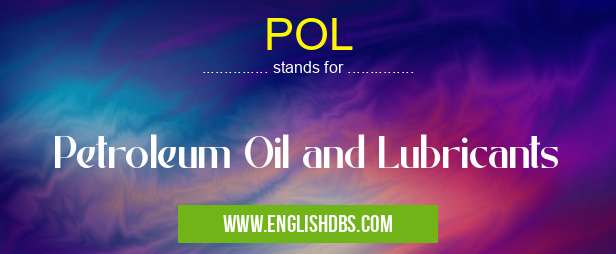What does POL mean in UNCLASSIFIED
The acronym POL stands for Petroleum Oil and Lubricants. It is a term used in many different industries, especially the fields of engineering, logistics, and supply chain management. Petroleum oil and lubricants are one of the most important components in the operation of many types of equipment and machinery. Whether it's for automotive, industrial or construction purposes, these vital materials must be supplied safely and reliably to ensure high performance from the system at hand.

POL meaning in Unclassified in Miscellaneous
POL mostly used in an acronym Unclassified in Category Miscellaneous that means Petroleum Oil and Lubricants
Shorthand: POL,
Full Form: Petroleum Oil and Lubricants
For more information of "Petroleum Oil and Lubricants", see the section below.
What is POL? Petroleum oil and lubricants (POL) are various types of oils or greases that are used to provide lubrication between moving parts in a machine or engine. These materials reduce friction, heat buildup, and wear on surfaces that can otherwise cause premature wear and tear on those same parts. In general, they can be divided into two main categories
petroleum-based lubricants such as motor oil and synthetic lubricants such as hydraulic fluids. Each type has its own unique benefits that can increase performance in specific applications and conditions.
Benefits of POL
Using POLs offers several key benefits for industrial operations. First, they prevent overheating that can cause damage to machinery components as well as major downtime due to unscheduled maintenance costs. Second, they help reduce energy consumption by decreasing friction between moving parts-- resulting in more efficient operation overall. Finally, POLs protect the surface areas on machinery components from degradation caused by corrosive elements like saltwater exposure or even weathering over time.
Essential Questions and Answers on Petroleum Oil and Lubricants in "MISCELLANEOUS»UNFILED"
What is Petroleum Oil and Lubricants (POL)?
POL stands for Petroleum Oil and Lubricants. It refers to the oil-based products used in a variety of industries, such as automotive, aviation, marine, and industrial applications. The lubricants help reduce friction between moving parts in order to maintain optimum performance of machinery and equipment.
What are the main types of POL?
There are two main types of POL: petroleum-based lubricants and synthetic-based lubricants. Petroleum-based lubricants offer superior protection against wear and tear as well as protect against corrosion. Synthetic-based lubricancts provide improved stability over a wider range of temperatures.
How often should I replace my POL?
The frequency with which you should replace your POL depends on the type of machine or vehicle you are using it for. Generally speaking, you should check your manufacturer’s recommendations regarding recommended replacement intervals for your particular lubricant, or consult a qualified technician who can advise you accordingly.
Do I need to use specialized tools when replacing my POL?
In some cases specialized tools may be required when replacing your POL. This typically applies when dealing with sealed units or components that require hydraulic pressure in order to access the pump/piston area where the lubricant needs to be replaced. In this case it is important that all instructions provided by the manufacturer are followed precisely.
Is it safe to mix different types of POL?
In certain cases mixing different types of POL could cause damage to engines, pumps or other moving parts due to incompatibility between formulations. Therefore it is not recommended that different types of fuels be mixed together without first consulting a qualified technician or the manufacturer’s instructions regarding acceptable mixing procedures and compatible products.
Are there any environmental impact from using Petroleum Oil and Lubricants?
Yes, petroleum-based products have an environmental impact due to their carbon dioxide emissions generated during combustion processes performed during their use in various applications including transport vehicles such as automobiles and boats as well as industrial machinery operations like construction equipment and manufacturing plants.
How do I know if myengine requires more pol than normal?
If your engine requires more pol than normal, it is usually indicated by reduced power output from your engine or an increase in vibration levels due to excessive friction between moving parts within the engine chamber.
What happens if I use too much POL?
Using too much POL can lead to clogged filters, blocked drains or seals causing poor fuel economy, increased emissionsand reduced performance from your engine.
Final Words:
In sum, Petroleum Oil and Lubricants (POL) is a term used for substances such as motor oil or hydraulic fluid used to reduce friction between moving parts in machinery or engines. This process improves performance by reducing heat buildup while also saving energy consumption due to less drag on the system itself. Furthermore, it also helps protect surfaces from corrosion over time which keeps them running longer with fewer issues along the way.
POL also stands for: |
|
| All stands for POL |
